(During December we will be reprising some of “2017’s greatest hits” from the Act Locally Waco blog. I couldn’t possibly pick my favorites – so I used the simple (cop out?) approach of pulling up the 10 blog posts that got the most “opens” according to our Google Analytics. It is an intriguing collection that gives at least a little insight into the interests and concerns of Act Locally Waco readers. I hope this “Top 10” idea inspires you to go back and re-read your personal favorites. There have been so many terrific ones… If you would like to see the Top 10 according to Google Analytics, here’s the link: 2017 Greatest Hits. Merry Christmas! — ABT)
by Rebecca Melton Mercer
A good friend of mine often texts me with the best conversation starter, “So what’s really good?”
So what’s really good, Waco?
Here’s something I think is really good. A new hot spot in town that is the product of a 32 year-old family business and a community that has been gathering since long before #Wacotown was a thing. Back in the corner of a shopping center at 1427 S Valley Mills Drive, just a short walk from Bankston’s Comics, people of Waco are gathering. People of all walks of life, and all ages are meeting up to discuss their common interests in a place that welcomes all, where they can grab a meal, play games, or geek out about things they love.
It’s called King’s Landing. It’s a little hard to describe exactly what King’s Landing is. Proud owner Brent Bankston told the Waco Trib it was a “Game Café and retail location.” I would call it the best clubhouse ever!
Geeks and Gamers. Fans and Food.
The force of community is strong here. And like several places in Waco, the community that is building here is one that looks like Waco. There are truly people from all ages and stages and walks of life. Everything from a mutual love for “Walking Dead” to Super Mario Bros. is bringing them together.
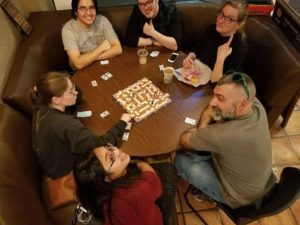
Game night demos with Wade, photo by Kyndall
Bringing people together is something the gaming community is experiencing in big ways in recent years as people are seeking ways to spend time interacting, and gaming seems to be just part of what is bringing people together. As long-time Bankstons employee and my friend Jamie Cooley said recently, people who love playing games of all types and many who had played years ago are “coming out of the closet AND going in to their closets” to drag out sets of Magic the Gathering and Pokémon games, board games, and video games to play with friends and family. There’s a noticeable movement to spend more face to face time in the age of FaceTime.
The thing about “geek culture” is that it was once seen as limited to a few. And those few weren’t always understood or loved by the rest. But in recent years that has changed. ComicCons are more mainstream, “geek” has risen from a put-down to a badge of honor, and the characters, teams, and sub-cultures people love have become a way to strike up a conversation with new people or safely bond with those we already know and love.
2016 was noted for divisiveness, and there’s something beautiful about watching people dive in to a role-playing game like Dungeons and Dragons and just enjoy a game and a story together. Or to watch the Central Texas Artists Collective (CTAC) folks walk around their newest display of artwork on the walls and discuss their creative process with King’s Landing guests.
I can grab a locally brewed-beer or locally roasted latte, then head back to the back of the building where a family enjoys pinball and arcade games together and a few folks debate which of the retro video game systems they love the most and why. My husband can again admire the mounted Hylian Shield and Master Sword that he really, really likes. (That’s from the fandom of Zelda, if you, like me, didn’t know.)
I’ve never dropped by and not had to navigate around smaller groups of patrons intently enjoying a game or conversation. But even though I’m fairly new to all of this, there’s an air of welcome and openness.
From King’s Landing you can easily walk over to Bankston’s Sports Memorabilia, Comics and Collectibles and catch a conversation about sports teams of old, check out that autographed picture of the famous punch thrown by Nolan Ryan, re-hash Baylor/ home team sports, or watch a parent and child head towards the carefully-maintained comic book wall to catch up on the latest story line.
Events. Events. Events!
In either location, get the scoop from employees about the many upcoming events. The crew travels to schools and ComicCons, and locally hosts community fundraiser events, book signings, artist meet and greets, cosplay volunteers, meet ups after movie releases, and the ever-growing Free Comic Book Day celebration every May. There are LGBTQ groups who meet, ladies who lunch and gather for fierce Mahjong play, groups who paint miniature game pieces, artists who draw together, community gatherings, private events, and on and on. Whew! Good thing there’s social media to help spread the word on all the things. (Check out the Epic Valentine’s Day Event this weekend!)
Family Business
Talking to Brent Bankston will quickly get you to the topics of community and family. Brent’s children and many other members of his family work here when they can. The catering business his wife Lee started in their home kitchen has taken new life in Butter my Biscuit, the delicious cafe part of the multi-faceted business that draws people to the shop on Valley Mills every weekend with scratch-made biscuits crafted into savory entrees, sandwiches, snacks and sweet treats. This business deeply cares and seeks to intentionally build a tolerant and positive place that serves our community.
Join the Fun!
Whether you’re looking to let your geek flag fly, are curious, hungry, bored, new in town, looking to reminisce, connect with some friends and family or what the heck ever, I encourage you to check this place out. If we’re there, my husband is the guy with the Batman tattoos who speaks way more geek than me. But all are welcome here, even a muggle like me.
 Rebecca Melton Mercer moved to Waco (on purpose) from Houston in 2007 and claims Waco as her adopted home town. Although the “job” she’s most proud of is Mom to two smart kids, nowadays she also spends a lot of time teaching English at LaVega High School, and runs a small business as a social media consultant that gets her out in the community and is as much fun as it is work. Rebecca has been active in building community through her work with Social Cents, her social media consultancy that serves small businesses and non-profits, with The City Review, a local alternative and entertainment newspaper, teaching in local private and public schools, and volunteering with non-profits that serve the Waco area. Rebecca, along with her husband Jeremy Mercer and the two awesome kids previously referred to, enjoy supporting the creative and positive things that Waco has to offer.
Rebecca Melton Mercer moved to Waco (on purpose) from Houston in 2007 and claims Waco as her adopted home town. Although the “job” she’s most proud of is Mom to two smart kids, nowadays she also spends a lot of time teaching English at LaVega High School, and runs a small business as a social media consultant that gets her out in the community and is as much fun as it is work. Rebecca has been active in building community through her work with Social Cents, her social media consultancy that serves small businesses and non-profits, with The City Review, a local alternative and entertainment newspaper, teaching in local private and public schools, and volunteering with non-profits that serve the Waco area. Rebecca, along with her husband Jeremy Mercer and the two awesome kids previously referred to, enjoy supporting the creative and positive things that Waco has to offer.
Whether it’s playing trumpet in the “Friday Band” at MCC or playing board games at King’s Landing, One of the wonderful things about Waco is that there are lots of ways to find community here. Where do you find community in Waco? Would you be interested in writing about it? If so, let us know. Email [email protected] if you have an idea for a post. You could be seeing your own picture on this page!
by Angie Veracruz
“We create because we have been created by the creator of all things; therefore, it is in us to create. It is an abundant circle.”
I often speak these words in conversations about why we on a conscious/semi-conscious level collectively do art: the creation of paintings, sculptures, dances, music, writings, etc. Art’s intended purpose, whether intuitively or intentionally, abstract or skillfully accurate, is the expression or application of human creative skill and imagination, to be appreciated primarily for its visual or emotional power.
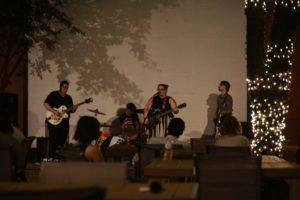 I observe you and can see the divine creation you were intended to be. I can see where life hardened and wrinkled your once smooth features, has now softened your edges as the years pass by. I want to paint you, but mostly experience you in all your amazing wonder. To hear the music in your laugh. To watch as tears create streams down your face. To feel your presence within reaching distance. To me, you are already a wondrous work of art needing no more labels, definitions, separations, or divisions. You are artwork and the artist. You are human.
I observe you and can see the divine creation you were intended to be. I can see where life hardened and wrinkled your once smooth features, has now softened your edges as the years pass by. I want to paint you, but mostly experience you in all your amazing wonder. To hear the music in your laugh. To watch as tears create streams down your face. To feel your presence within reaching distance. To me, you are already a wondrous work of art needing no more labels, definitions, separations, or divisions. You are artwork and the artist. You are human.
Arts and Culture in Waco
Waco’s arts community has been growing for years. I believe we all understand the benefits a thriving arts and cultural community imparts on a city. Here are a few reminders as described by Fiona Bond, Creative Waco Director, a thriving arts and cultural community…
- attracts artists and cultural enterprises to the community
- encourages business and job development
- addresses specific needs of a community
- establishes tourism destinations
- preserves and reuses historic buildings and historic community assets
- enhances property values and fosters local cultural development.
Over the past two years, Creative Waco has pulled together our community by highlighting many of the wonderful arts and cultural activities happening around Waco. After a long and tedious process with many meetings, emails, opinions, suggestions, events and art happenings, the application was finished, submitted on time, and Waco was awarded a Cultural Arts District status.
What next?
Now more than ever, however, we cannot take support for the arts for granted. The Texas Commission on the Arts, including the $5M appropriation for Cultural & Fine Art Districts secured through the legislative advocacy work of Texans for the Arts in the 83rd Session, has been removed from the Senate budget. This will directly affect Waco’s newly established Cultural District.
It is up to you, me and every citizen of Waco to show support for the arts. I recommend two ways. The first is direct advocacy. There are several ways you can get involved to show your support.
- Become a member of the Texans for the Arts to stay in the know about all things arts related in Texas.
- Support your local arts organizations like Central Texas Artist Collective, Waco Poets Society, Creative Waco, Waco Cultural Arts Festival, Art Center of Waco, Art on Elm, First Fridays, and more!
- Write a letter of concern, or support in restoring the funds to the budget, to the following:
- Ann Graham, Executive Director for Texans for the arts: [email protected]
- Jennifer Ransom Riche and Ashley Martin, Texas cultural Trust: [email protected], [email protected]
- Ben Stratmann & Liz Sanchez, Sen. Birdwell’s Office: [email protected], [email protected]
- Rep “Doc” Anderson: [email protected]
- Rep Kyle Kacal: [email protected]
In addition to direct advocacy, get involved with creating the arts and culture identity of Waco. It’s easier than you think. Every day we in Waco are creating our arts and culture identity through the initiatives we support and our attendance at new and favorite festivals such as Deep In The Heart Film Festival (2/16-19), Illectric River Festival (3/18), Texas Food Truck Showdown (4/01), and Art On Elm (4/8).
When we gather with friends for live concerts at the Backyard, when we attend a play or two at Waco Civic Theatre and Jubilee Theatre we are creating our identity. When we enjoy the full orchestra, a concert band, a jazz band, or any blend of musical talents at Waco Hall, Ball Performing Arts Center, or Indian Spring Outdoor Amphitheater we are creating our identify. When we catch an independent musician performing at Dichotomy, Common Grounds, or any fine establishment we are creating our arts and culture identity.
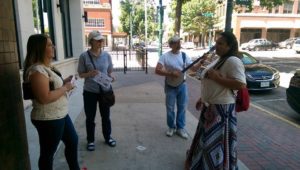 When we start looking, something visually unique and beautiful finds us. Walk through our local galleries such as Art Center of Waco, Martin Museum, or Studio Gallery. Or, enjoy the art in businesses like the Hippodrome, Tea2go, Rufi’s Cocina, Shorty’s Pizza Shack, and so many more places! You can find all the wonderful murals while driving around our beautiful city, and take in the outdoor sculptures that can be found like hidden gems. These are all a part of our arts and culture identity.
When we start looking, something visually unique and beautiful finds us. Walk through our local galleries such as Art Center of Waco, Martin Museum, or Studio Gallery. Or, enjoy the art in businesses like the Hippodrome, Tea2go, Rufi’s Cocina, Shorty’s Pizza Shack, and so many more places! You can find all the wonderful murals while driving around our beautiful city, and take in the outdoor sculptures that can be found like hidden gems. These are all a part of our arts and culture identity.
Looking for creative ways to get involved in our community?
This past August, Central Texas Artist Collective created a walkable art exhibit called EKPHRASIS: Art & Words. The premise was to pair a visual artist and a writer to collaborate and create an ekphrastic display. The artwork and written pieces were exhibited in the storefront windows of 13 businesses facing Austin Ave between 6th and 8th streets. Over 50 artists, writers, and musicians participated in the exhibit. The opening event drew in community members from all over McLennan County and friends from out of state attended to support their artists.
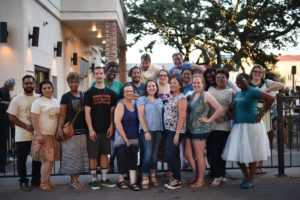 Although the 2016 exhibit did not have a theme, the overall idea was about community and communication. The purpose was to step out of the traditional art gallery and to feel free to roam from location to location. The viewer had the option to take a tour, led by myself, or explore on their own. Exhibit maps were given to the participating store locations for those who just happen to stumble upon the exhibit.
Although the 2016 exhibit did not have a theme, the overall idea was about community and communication. The purpose was to step out of the traditional art gallery and to feel free to roam from location to location. The viewer had the option to take a tour, led by myself, or explore on their own. Exhibit maps were given to the participating store locations for those who just happen to stumble upon the exhibit.
Then something wonderful happened — during the Friday voting night and Saturday opening event day — communication. Free flowing, engaged dialogues full of questions and support. Community members showed up and started having conversations about the artwork and written pieces with each other and the artists who were present near their work.
This year CTAC intends to reprise the EKPHRASIS exhibit by focusing the displays and dialogue on a specific community issue that is necessary to address, difficult to navigate alone, and should have a positive impact towards change in our community.
Currently we are putting together an Ekphrasis Committee who will decide the theme, determine every one’s strengths and level of commitment, then plan a timeline for the exhibit. Our first committee meeting was held at the Provender Store, 60 Austin Ave on Feb 4, 2017 at noon; monthly meetings will occur every 1st Saturday and as needed until the event. If you are interested in joining the committee, please email CTAC at: [email protected]. If you would like to stay informed about the call to artists & poets, and any other community creative outlets, like artjams, exhibits, artisan markets, and more! “like” the CTAC facebook.com/CenTexArtists page. You are a part of the arts community of Waco!
 Angie Veracruz is an intuitive artist who is influenced by the world around us and reflective insights. She is the mother of three beautiful girls and their biggest education advocate. She is also a Co-Founder and Executive Director of Central Texas Artist Collective. She is a member of Texans for the Arts and an arts advocate in the making.
Angie Veracruz is an intuitive artist who is influenced by the world around us and reflective insights. She is the mother of three beautiful girls and their biggest education advocate. She is also a Co-Founder and Executive Director of Central Texas Artist Collective. She is a member of Texans for the Arts and an arts advocate in the making.
The Act Locally Waco blog publishes posts with a connection to these aspirations for Waco. If you are interested in writing for the Act Locally Waco Blog, please email [email protected] for more information.
By Madison Albee
McLennan Community College recognizes that life can sometimes get in the way of achieving educational goals. That is why we have set up a series of student success initiatives, so students may find the resources, encouragement, and guidance they need to be successful now and in the future.
Completion Center
The Completion Center understands that there is more to a student’s life than college. MCC provides Success Coaches to help students find a way to balance it all. They are able to help students who want to see change in their lives, whether that be academic or outside of the classroom. Success Coaches meet with students one-on-one to help them with assetiveness, leadership, time management, decision making, and facilitating positive change. They also help students find resources for food, shelter, transportation, and health when needed. A student’s Success Coach continues to mentor them throughout their time at MCC to make sure they are overcoming their obstacles and meeting their goals.
Student Services Center, Second Floor, Completion Center
254-299-UCAN (8226)
Support and Empowerment Program
Started in 1979 as community service by the Junior League of Waco, Inc., The Support and Empowerment Program has now helped more than 7,000 students find the strength to begin a new life. McLennan Community College offers special services to single parents and displaced homemakers who want to continue their education but might need some help doing so. Some of the services available include funds for childcare, crisis intervention, academic counseling, stress management, and parenting workshops.
Adrienne Potts is a nursing student and mother who has participated in the program for most of her time at MCC. Potts feels that the Support and Empowerment program counselors have helped her greatly with trying to balance school and home life. “I can see they genuinely care about me and my success as a student. They are rooting me on as my #1 fan,” she said.
Lizette LaStrape
SEP Program Coordinator
254-299-8600
[email protected]
Men of Color Initiative
Historically men of color have faced many challenges in obtaining a college degree such as lack of role models, cultural barriers to higher education, and community pressures. The Men of Color Initiative at MCC encourages young men to stay in school and succeed in life. Students are mentored by MCC faculty and staff on their academic progress and attendance, and mentors support them in handling difficult situations. Mentees are able to develop a network of contacts, increase self-confidence, and experience success and recognition. This initiative not only strives to increase the retention and completion rates of traditionally unrepresented groups but also hopes to increase the campus’ awareness of issues with diversity and equity.
Ronald Hochstatter
254-299-8944
[email protected]
TRIO Student Support Services
One of eight federally-funded TRIO programs, MCC’s Student Support Services is designed to improve student retention, graduation, and overall success rates. Student Support Services (SSS) offers free academic services to help students continue at MCC, graduate, and transfer to a four-year college or university in a timely manner. Students are able to participate in four-year campus visits and tours, tutoring sessions, financial aid and scholarship searches, as well as career and financial counseling.
Dawn Shulz, a TRIO alum and MCC graduate, reflected on how the program helped her while she was here. “I no doubt have an increased confidence in myself and my academic abilities through all the access to cultural events, leadership opportunities, and community volunteering… experiences that I might not have found on my own,” she said.
Student Services Center, Room 304
254-299-8431
Participation in these programs has led many students to pursue opportunities they might not have had otherwise. If you know a student that might be letting life get in the way of pursuing their educational goals, let them know there are resources available to them. Please use the contact information provided to easily reach out and get assistance.
 Madison Albee is a senior at Baylor University from Fort Worth, Texas. She is studying journalism/public relations with a concentration in marketing and is graduating this coming May. Currently Madison works for MCC as a public relations intern in the marketing and communications department. She is also the public relations assistant for Luca Magazine.
Madison Albee is a senior at Baylor University from Fort Worth, Texas. She is studying journalism/public relations with a concentration in marketing and is graduating this coming May. Currently Madison works for MCC as a public relations intern in the marketing and communications department. She is also the public relations assistant for Luca Magazine.
The Act Locally Waco blog publishes posts with a connection to these aspirations for Waco. If you are interested in writing for the Act Locally Waco Blog, please email [email protected] for more information.
By Bill Gaventa
This last weekend saw one of the most popular service events in Waco, the Really Big Fishing Event for very Special People. The pictures in the WacoTrib were great as was the effort and support put in by so many people and organizations in the Waco area”. But there is a “catch” here (so to speak) and one that is not meant to criticize the event at all. In fact, it is a positive illustration of the very point I wish to make.
The day of fun and service drew together people who often move in very separate worlds. One of the biggest issues for people with intellectual and developmental disabilities, as well as people with other disabilities, is the fact that social, cultural, and architectural barriers often limit their opportunities to participate fully in the kinds of activities many of us take for granted. On the other hand, many people we might call “non-disabled” don’t see or interact with people with disabilities on a regular basis, sometimes because the services and supports for them can separate them from typical settings, or because they stay at home with nothing meaningful to do.
Thus, we end up in a world where people who labeled “disabled” are often seen in one conceptual box, and people labeled “normal” are in another. The problem with these kind of labels is they take on far too much power by seeing a person only by one dimension of their lives. That’s not just a problem here: think now-a-days about political labels, racial labels, cultural labels, religious labels, sexual labels…the list can go on and on. Those labels prejudice what we see, because they fill a whole backpack of assumptions and expectations that we think are true about another person even before we know them. In her famous TED Talk, Nigerian novelist Chimamanda Adichie calls it “the danger of a single story.” Every one of us has experienced that from other people in a way that does not feel right or true to who we are.
Labels put people in boxes in the shelves of our minds. What we need, in so many ways, are bigger boxes into which two boxes labeled differently can fit. Hence the Really Big Fishing Event for Very Special People. The bigger box was fishing, an activity that people from all kinds of backgrounds enjoy. In fact, for avid fishermen and fisherwomen, the fact that some other people may love fishing but never have a chance to go fishing is the real tragedy or disability, not the other kinds of labels they may wear.
The potential power of this annual Saturday event might also lead to other opportunities for people who love fishing to find other ways to help people with disabilities who also love fishing to have more opportunities to do so. Not in big events, but rather in small boats, from the river bank, from the dock, opportunities where the fishing “box” helps tackle the stereotypes and fears we may have, and where people then build relationships and friendships that mess up our smaller boxes and more rigid labels.
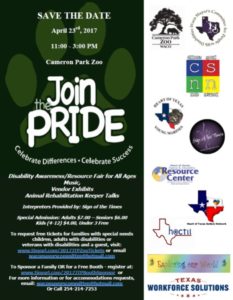 There are organizations around Waco making great strides in building those bigger boxes. Sports brings people together with many levels of ability in Special Olympics and No Limitations Athletics. The Arc of McLennan County uses country music, barbecue and a raffle auction to bring together people in the community who support individuals and families. The Autism Walk on Saturday, April 8 does the same as does art in several venues and programs. Join the Pride, an event on April 23, uses the great Cameron Park Zoo to do the same, as well as to celebrate people of all abilities at a zoo with a great reputation for its work in support of animals with one form of disability or another. The Waco Mayor’s Committee on Disabilities coordinates this upcoming event with sponsors who help the day to be free for people with disabilities and their families. Volunteers are both needed and welcome.
There are organizations around Waco making great strides in building those bigger boxes. Sports brings people together with many levels of ability in Special Olympics and No Limitations Athletics. The Arc of McLennan County uses country music, barbecue and a raffle auction to bring together people in the community who support individuals and families. The Autism Walk on Saturday, April 8 does the same as does art in several venues and programs. Join the Pride, an event on April 23, uses the great Cameron Park Zoo to do the same, as well as to celebrate people of all abilities at a zoo with a great reputation for its work in support of animals with one form of disability or another. The Waco Mayor’s Committee on Disabilities coordinates this upcoming event with sponsors who help the day to be free for people with disabilities and their families. Volunteers are both needed and welcome.
The events are all inspiring not only because of the commitment and excitement that runs rampant but also because they find bigger boxes into which we all fit. They are doubly inspiring if we all look for ways this can happen in everyday lives. So rather than seeing people with differences as labeled boxes on a shelf, every time we see someone as “other,” or “not like me,” could we not ask ourselves: “Gee, I wonder what bigger box we could both fit into.” They are not hard to find and not hard to build.
All we must do is start the conversation, reach beyond the boxes in which might find ourselves, introduce yourself, and ask questions about who they are, what they like to do, and the dreams they have. Ronald Reagan first designated March as National Developmental Disabilities Month. If you want to do something in March, any of these organizations can help you. But perhaps you already know some individuals or families where you can start. There is no telling how many labels (and bigger boxes) you will find that you share in common with someone sitting on the shelf with you.
 Bill Gaventa is an ordained Baptist minister currently serving as the Director of the Summer Institute on Theology and Disability and the national Collaborative on Faith and Disability. . Bill’s pastoral career has been in a variety of roles at the intersections of faith and disability, including community supports with people with disabilities, training for clergy, seminarians and community services staff, aging and end of life/grief issues in intellectual and developmental disabilities, cultural competence, and community building. He is currently serving as the President of American Association of Intellectual and Developmental Disabilities for 2016-2017. He and his wife Beverly moved to Waco in 2013 where she serves as Professor of New Testament Interpretation at Baylor University. In Waco, Bill serves on the Mayor’s Committee on Disabilities, the Board of the Arc of McLennan County, and the Professional Network Advisory Committee of the Heart of Texas Region MH/MR Center. You can email Bill at [email protected].
Bill Gaventa is an ordained Baptist minister currently serving as the Director of the Summer Institute on Theology and Disability and the national Collaborative on Faith and Disability. . Bill’s pastoral career has been in a variety of roles at the intersections of faith and disability, including community supports with people with disabilities, training for clergy, seminarians and community services staff, aging and end of life/grief issues in intellectual and developmental disabilities, cultural competence, and community building. He is currently serving as the President of American Association of Intellectual and Developmental Disabilities for 2016-2017. He and his wife Beverly moved to Waco in 2013 where she serves as Professor of New Testament Interpretation at Baylor University. In Waco, Bill serves on the Mayor’s Committee on Disabilities, the Board of the Arc of McLennan County, and the Professional Network Advisory Committee of the Heart of Texas Region MH/MR Center. You can email Bill at [email protected].
The Act Locally Waco blog publishes posts with a connection to these aspirations for Waco. If you are interested in writing for the Act Locally Waco Blog, please email [email protected] for more information.
By Christina Helmick
Have you ever been working on a project, article or something else in the health-realm of things, and wanted to see how Waco stood against other cities? If so, you were met with the reality that health data is only available at the county level, until now. The Robert Wood Johnson Foundation, National Resource Network (NRN) and the NYU School of Medicine have piloted a joint venture of analysis and producing city-level health data.
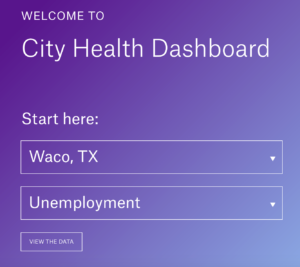 Waco, along with other cities across the nation, took part in a competitive application process to pilot this program. Accompanying Waco in this pilot program are three other cities: Flint, Michigan; Kansas City, Kansas; and Providence, Rhode Island. What is a common thread between us and the other three cities? We all face economic challenges and are working hard to improve the overall quality of life.
Waco, along with other cities across the nation, took part in a competitive application process to pilot this program. Accompanying Waco in this pilot program are three other cities: Flint, Michigan; Kansas City, Kansas; and Providence, Rhode Island. What is a common thread between us and the other three cities? We all face economic challenges and are working hard to improve the overall quality of life.
You can view the City Health Dashboard by clicking here.
Okay, so let’s look at a metric together. Click “Waco, TX” and are click “Unemployment.” What appears is a whole bunch of numbers and a visually pleasing map. What does that all mean?
Waco’s average for unemployment is 8.5%. Particularly useful, the dashboard also notes how far above or below the national average Waco sits. Waco’s unemployment rate is 3.5% above the national average of 5% — meaning Waco has more people seeking jobs and unable to find a job than the national average.
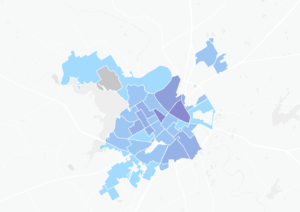 The map shows what parts of the city have higher rates of unemployment than others. A darker purple means higher unemployment and light blue means lower rates of unemployment. In our city, there are pockets of high and low unemployment rates—the lowest rate being 1.4% and the highest rate being 24.4%.
The map shows what parts of the city have higher rates of unemployment than others. A darker purple means higher unemployment and light blue means lower rates of unemployment. In our city, there are pockets of high and low unemployment rates—the lowest rate being 1.4% and the highest rate being 24.4%.
Also useful is the notation of the data source, years of collection and the definition of how the measure is calculated. When looking at unemployment, the data comes from the Census data using a 5-year estimate. The 5-year estimate means the data was collected between January 1, 2010, and December 31, 2014. The definition of unemployment is as follows: percent of the civilian population age ≥ 16 that is unemployed but actively seeking work.
Being able to have this disaggregated data allows our community to better target our efforts. So, by looking at the Unemployment data from the City Health Dashboard, we are able to connect the Waco Foundational Employment Network’s efforts to certain areas in our community. The city-level data can be passed to community partners, such as Skillpoint Alliance, to help them target recruitment efforts for their free rapid workforce training program. Or, to Goodwill Industries to promote their career fairs and the free job training classes they offer.
I know (first-hand) data can be intimidating and confusing, so don’t forget that the Prosper Waco team is here to help. Our director of data and research, Brittany, is a data guru and loves to help organizations and people better understand how to find data, understand data and (better yet) how to effectively use data. She can be reached by sending a quick email to [email protected].
 Peruse the health dashboard to look at the 26 different measures. Is there one that sparks your interest? For me, it’s the walkability measure. Waco scored 34 out of 100. We can do better! One group in town that is working to improve walkability is Waco Walks. I’m adding their next meeting to my calendar so I can help be part of the solution of improving our community, one step at a time.
Peruse the health dashboard to look at the 26 different measures. Is there one that sparks your interest? For me, it’s the walkability measure. Waco scored 34 out of 100. We can do better! One group in town that is working to improve walkability is Waco Walks. I’m adding their next meeting to my calendar so I can help be part of the solution of improving our community, one step at a time.
 Christina Helmick is the director of communication at Prosper Waco. She is a recent graduate of Baylor University with a BA in Journalism, Public Relations & New Media. Originally she is from Washington, D.C., but has stayed in Waco post-graduation. She is an active mentor at J.H. Hines Elementary School, enjoys spending time with her family and watching Baylor football. Sic ’em Bears!
Christina Helmick is the director of communication at Prosper Waco. She is a recent graduate of Baylor University with a BA in Journalism, Public Relations & New Media. Originally she is from Washington, D.C., but has stayed in Waco post-graduation. She is an active mentor at J.H. Hines Elementary School, enjoys spending time with her family and watching Baylor football. Sic ’em Bears!
The Act Locally Waco blog publishes posts with a connection to these aspirations for Waco. If you are interested in writing for the Act Locally Waco Blog, please email [email protected] for more information.
By Courtney Restivo Wollard
As a follow up to a previous healthy blog post, I wanted to highlight one of the partners in the Healthiest Cities and Counties Challenge (HCCC) – The CenTex Hispanic Chamber of Commerce.
 Throughout the years, the Chamber has hosted free family funfests and women’s conferences during the month of February. This year, the event will focus on empowering women’s health, heart, soul, family, and home. It’s called the Hearts & Homes Ladies’ Conference. The event will include several vendor booths to provide information on resources to the community including career building and home buying assistance, home maintenance tips, and a wellness zone plus door prizes! Lunch and snacks will also be provided. Something new this year that the Chamber will offer as a partner in the HCCC will be providing a healthy traditional Hispanic meal cooking demonstration and food sampling during the event.
Throughout the years, the Chamber has hosted free family funfests and women’s conferences during the month of February. This year, the event will focus on empowering women’s health, heart, soul, family, and home. It’s called the Hearts & Homes Ladies’ Conference. The event will include several vendor booths to provide information on resources to the community including career building and home buying assistance, home maintenance tips, and a wellness zone plus door prizes! Lunch and snacks will also be provided. Something new this year that the Chamber will offer as a partner in the HCCC will be providing a healthy traditional Hispanic meal cooking demonstration and food sampling during the event.
If you didn’t catch the previous blog about the Healthiest Cities and Counties Challenge, I will briefly describe its importance for our community. This is a national challenge consisting of 50 other communities (Waco-McLennan County included) all working to improve the health of their residents in many different ways. Communities could choose to improve on one of five metrics including community safety, built environment, social/economic factors, environmental factors, and healthy behaviors. Some communities are focusing on improving asthma rates for children, others are working to prohibit smoking in vehicles with children, some working to improve physical activity opportunities, and some are working on improving wastewater management. Waco-McLennan County will be working on the healthy behaviors metric more specifically increasing healthier eating and consumption of fruits and vegetables. The top communities at the end of the two year challenge (which began October 2016) that show an improvement in their metrics compared to baseline data submitted could win prize money for the community between $25,000 and $250,000 for our community tier.
All of that to say, it is important that residents know how to cook meals in a healthier way and learn how to incorporate more fruits and vegetables into their daily diet. That is where our partner, the CenTex Hispanic Chamber of Commerce comes in. They will be hosting three healthy traditional Hispanic meal cooking demos and samplings throughout the two year challenge in order to educate community members on cooking their favorite comfort foods in a healthy way and in a way that tastes great. The Hearts & Homes Ladies’ Conference is where the first of the three cooking demos will occur. We are very grateful to have the Chamber join in this fun and healthy challenge and we challenge you to eat more fruits and veggies! Be sure to attend the event on February 25th 2017 at the Waco Convention Center in McLennan Hall from 10am-3pm so you can be a part of the Healthiest Cities and Counties Challenge!
 Courtney Restivo Wollard is a lifelong Waco resident who works as Public Health Planner at the Waco-McLennan County Public Health District and serves as Chair for Live Well Waco, the group working to decrease obesity rates under the Prosper Waco Health Committee Initiative. She is also an alumnus of the Waco Foundation LeadershipPLENTY Institute. Courtney graduated with her Masters of Public Health from Baylor University and right away began her career as a health advocate. She is married to Kyle, with whom she has two fur babies – a Chihuahua and a Labrador. Courtney hopes to continue to create healthier environments for McLennan County residents.
Courtney Restivo Wollard is a lifelong Waco resident who works as Public Health Planner at the Waco-McLennan County Public Health District and serves as Chair for Live Well Waco, the group working to decrease obesity rates under the Prosper Waco Health Committee Initiative. She is also an alumnus of the Waco Foundation LeadershipPLENTY Institute. Courtney graduated with her Masters of Public Health from Baylor University and right away began her career as a health advocate. She is married to Kyle, with whom she has two fur babies – a Chihuahua and a Labrador. Courtney hopes to continue to create healthier environments for McLennan County residents.
The Act Locally Waco blog publishes posts with a connection to these aspirations for Waco. If you are interested in writing for the Act Locally Waco Blog, please email [email protected] for more information.
By Bruce Gietzen
Remember the Jeff Foxworthy TV show “Are you smarter than a 5th grader?” I remember watching, and too many times the answer to that question was a resounding “No”!
That was old school. Waco ISD has a newer – and younger version that may make you feel even more embarrassed unless you’re a parent of one of our 4-year olds in the District’s acclaimed prekindergarten program.
Every Waco ISD elementary campus plus University High School has at least one of those early success classrooms – there are 55 in all. Each and every one of nearly a thousand students in the program get a great start on being smart.
Plus, it’s not just the little folks who learn. Moms and Dads in those families are having intelligent dinner conversations with their children because of our family engagement plan.
Kids go home with letters – in English and Spanish – that explain the Science, Technology, Engineering and Math they’re learning. Those letters also include questions parents can ask about the class day, so students barely old enough to tie their shoes can tell Dad how heat can turn a solid into a liquid.
It’s all pretty cool, and apparently state lawmakers agree. They appropriated $118 million dollars for high quality prekindergarten programming. Waco ISD got nearly $650 thousand dollars of that to spread over two years, and those funds are making a good program even better.
To qualify to get money, school districts were required to meet enhanced quality standards in curriculum, teacher qualifications, academic performance and family engagement. WISD was already on board with most of those.
The comprehensive science curriculum encourages learning by doing, and doing it a lot more often. Two years ago Waco ISD teachers reported spending an average of 36 minutes each day on STEM related instruction in preschool classrooms. The national average was about two minutes per day.
That 6,120 minutes – or more than 100 hours of added STEM learning – led to astounding results.
A 2016 Meadows Children at Risk Pre-K report found economically disadvantaged third graders who attended full day Texas pre-kindergarten had 40 percent higher odds of reading at a college-ready pace in the third grade (the key grade to measure reading proficiency).
Those same students also scored approximately 80 points higher on the 3rd Grade STAAR Reading exam.
I haven’t even gotten to the best part. If your child qualifies for the Waco ISD program, it’s FREE!
When the state provided the funds to pay for half a day of instruction for these young people, WISD’s Board found the money to pay for the other half. Thank you, Trustees, for that wise investment in our future!
You should know not everyone qualifies for the program. Family income is a factor, and so is age. A child is eligible for enrollment if he or she is at least four years old by Sept. 1, and meets at least one of the following criteria:
- Unable to speak or comprehend the English language;
- Educationally disadvantaged (which means a student eligible to participate in the national free or reduced-price lunch program);
- Homeless (This is more common than you think. Waco ISD has more than 1,000 homeless kids in K-12);
- The child of an active duty member of the U.S. armed forces;
- The child of a member of the U.S. armed forces who was injured or killed while serving on active duty;
- Is or ever has been in foster care.
There is a teacher and a teacher’s aide in every classroom, which means an 11-1 ratio of educator to student.
What kinds of things will they learn? Simple science investigations help them ask the right questions, gather information, and make informed decisions. Then they will knock your socks off explaining their findings.
These young students will study several new vocabulary words each day, and by the end of the year the ones who are learning English as a second language will know 1,000 more words and the correct sentence structure for using them. By the 2nd grade those kids will be fluent in two languages.
There’s also classwork in reading, writing, fine arts, and social studies – including the importance of voting. For good measure, preK students also practice basic functions on computers and related digital technologies, which breeds self-confidence.
Interested? Registration is in May, and if your child is the right age and meets one of those requirements listed above, it’s free. It’s one of the best investments you can make in your children.
That’s something even a 4-year-old can figure out. Especially one of ours!
I wonder if Jeff Foxworthy has been to Waco?
 Bruce Gietzen made the move from News Anchor at KXXV-TV to the Director of Communications at Waco ISD last June. He crossed from one side of the media fence to the other to help tell stories about some of the great things happening in WISD, including the efforts to revive the Planetarium at Waco High School. Bruce is also on the Board of Directors for Communities in Schools and the Texas Sports Hall of Fame, and he’s a member of the new Communications Task Force for Prosper Waco. He enjoys Waco with his wife, Dana, and if he had more spare time it might be spent on the golf course.
Bruce Gietzen made the move from News Anchor at KXXV-TV to the Director of Communications at Waco ISD last June. He crossed from one side of the media fence to the other to help tell stories about some of the great things happening in WISD, including the efforts to revive the Planetarium at Waco High School. Bruce is also on the Board of Directors for Communities in Schools and the Texas Sports Hall of Fame, and he’s a member of the new Communications Task Force for Prosper Waco. He enjoys Waco with his wife, Dana, and if he had more spare time it might be spent on the golf course.
The Act Locally Waco blog publishes posts with a connection to these aspirations for Waco. If you are interested in writing for the Act Locally Waco Blog, please email [email protected] for more information.
By Janessa Blythe
When I was a kid, my parents placed a bookshelf next to my room and my brother’s room. Every night, we’d pick a book, pick a parent, and spend a little time in another world. I remember always reading Amelia Bedelia with my dad, fairy books with my mom, and Harry Potter with the whole family.
Because that was all I had ever known, I assumed that most children grew up in households that emphasized reading daily.
In the fall of 2015, I ran a small book drive as a part of a course I was taking at Baylor. I knew that children from lower-income households probably had fewer books than their more affluent peers, but did not realize how great that difference was. The books we collected were given to some of the children at Estella Maxey Public Housing Complex here in Waco. When I delivered the books, I heard over and over again from the volunteers, “These kids just don’t have books at home.”
It turns out that the research shows that children from low-income households tend to lack access to books, and have few books in their homes. The US Department of Education found that 61% of low-income families have no books at all in their homes (US Dept. of Education, 1996). One example of this is low-income neighborhood in Philadelphia, where the University of Michigan found that the ratio was 1 book for every 300 children (Neuman and Celano, 2001).
Lack of book access is a huge issue for many of the children in our country, and it affects them every day both in an out of the classroom. According to the Education Equality Index, 60% of students in Texas are eligible for free and reduced lunch. The socioeconomic status of these children indicates that they more than likely lack access to books.
This is a problem because not all learning happens at school; children are only there about 7 hours a day, and they are only in school 9-10 months each year. This becomes an issue for lower-income students, because they lack learning resources at home. A study by the RAND Corporation about the “summer slide” found that “results in reading show that middle-income students maintained achievement levels over the summer while high-income students improved and low-income students lost ground” (RAND, 2011). Low-income students lose ground because they have fewer opportunities to practice their reading, or improve their reading when they are not in school.
There are a number of reasons for the lack of books in low-income households. There are libraries, but they are often far away and parent’s either don’t take their children, or don’t know that they should take their children regularly. School libraries often don’t allow books to be taken home, and are often unavailable in the summer. Finally, books are expensive and are difficult for low-income parents to afford.
When children from lower-income households go home, they don’t have the resources they would need to continue learning.
Scholastic’s Family and Community Engagement Research Compendium from 2013 puts the argument for book access succinctly:
- Children from less affluent families do not perform as well on achievement tests compared with children of more affluent families.
- These gaps related to families’ socioeconomic status are present even before children enter school.
- Reading to young children is related to stronger subsequent academic achievement.
- Children in low-income families have access to fewer reading materials than children of middle- and upper-income families.
Their conclusion is that “the only behavior measure that correlates significantly with reading scores is the number of books in the home,” and that “the most successful way to improve the reading achievement of low-income children is to increase their access to print” (Scholastic FACE, 2013).
We spend millions of dollars each year on education in America, but not all learning happens at school. Mortimer J. Adler once said that “the principle cause of the learning that occurs in a student is the activity of the student’s own mind.” When a child picks up a book, and struggles to understand what the letters on the page are communicating, that child activates his or her mind and is learning. This learning is unaided by a teacher, but it is learning all the same.
If a child has no books in their home, in the many hours they spend there, there is no prospect of picking up a book and learning to learn.
 Janessa Blythe is a junior at Baylor University originally from Colorado Springs, CO. She is studying Great Texts, Political Science, and Classics in the University Scholars Program, and anticipates attending law school when she graduates in May of 2018. She hopes to eventually work in education policy. In her free time, Janessa loves to spend her time outside, especially on the trails in Cameron Park.
Janessa Blythe is a junior at Baylor University originally from Colorado Springs, CO. She is studying Great Texts, Political Science, and Classics in the University Scholars Program, and anticipates attending law school when she graduates in May of 2018. She hopes to eventually work in education policy. In her free time, Janessa loves to spend her time outside, especially on the trails in Cameron Park.
The Act Locally Waco blog publishes posts with a connection to these aspirations for Waco. If you are interested in writing for the Act Locally Waco Blog, please email [email protected] for more information.
By Jamie Graham
Twenty-two years ago, I found myself lying on a massage table with fine thin needles being inserted into various parts of my body. The problem that had brought me to this unusual position was a monthly fluctuation in moods called Premenstrual Syndrome, accompanied by severe debilitating cramps. During my monthly cycle, I would swing between tears and irritability. Acupuncture had been recommended to me by a friend whose sister was attending the Academy of Oriental Medicine at Austin (AOMA). My friend assured me her sister, or one of her fellow interns in the student clinic at AOMA, would be able to help both with the pain and the moods.
 Being in such misery, I was willing to try anything. During my treatment, which included two interns and an instructor asking questions, taking my pulse and looking at my tongue, I mentioned I often had a feeling of something being stuck in my throat that wouldn’t go down when I swallowed. A look of understanding passed between the two interns and one of them explained this was something Chinese medicine called Plum Pi Qi and it clearly was indicated in my diagnosis of Liver Qi stagnation. After the needles were removed, they also gave me an herbal formula and recommended I return for future treatments.
Being in such misery, I was willing to try anything. During my treatment, which included two interns and an instructor asking questions, taking my pulse and looking at my tongue, I mentioned I often had a feeling of something being stuck in my throat that wouldn’t go down when I swallowed. A look of understanding passed between the two interns and one of them explained this was something Chinese medicine called Plum Pi Qi and it clearly was indicated in my diagnosis of Liver Qi stagnation. After the needles were removed, they also gave me an herbal formula and recommended I return for future treatments.
I was amazed at the results. I felt calmer, more centered and as a bonus, during the next monthly cycle, my cramps were much reduced. I was hooked.
Six years later, I was the intern seeing clients in the student clinic at AOMA. Many of those clients had mental health issues, ranging from depression, anxiety, grief, anger, PTSD and many others.
At AOMA, we learned emotional issues were related to stagnation of an energy called Qi (pronounced chee). Each emotion was also related to a specific organ system. Grief was related to lungs, anger and depression to liver, fear to kidneys, worry to spleen, overjoy (mania) to heart. By releasing this stagnation with the acupuncture needles and rebalancing the specific organ system, these mental health issues could eventually be resolved.
After graduation, I began to research how acupuncture helps resolve these issues. Western medicine had begun doing research studies on acupuncture. While many of these focused on pain, several of them also focused on mental health issues. There are many theories as to why acupuncture helps pain and other issues such as depression, anxiety and PTSD, one of the things we do know is acupuncture affects brain chemistry. It causes the body to release endorphins, serotonin, and enkephalins and other brain chemicals that help our body with pain, emotions and our immune system. It also increases receptor sites for these chemicals to attach to within the body.
One of the most interesting continuing education classes I have taken was working with veterans suffering from PTSD through an organization called Vet TRIIP (Veterans Team Recovery Integrative Immersion Process). This organization uses a multi-disciplinary approach to working with veteran PTSD. They incorporate tai chi or qigong, acupuncture, massage therapy, chiropractic, talk therapy and other modalities to help the veterans in their recovery.
The first veteran I treated was one who was, “wound very tight.” He had chronic pain in his lower back and neck. Using just a few acupuncture needles and sitting with him quietly, I watch as the tension left his body. After the needles were removed, he stood up, and a smile came across his face as he realized his pain had eased. “I feel so relaxed,” he said, “and the pain is much less.”
Another veteran I worked with was also a survivor of sexual assault. She was having severe anxiety and insomnia. She also had chronic pain. She, too, was very tense—emotionally and physically. During the treatment, she was actually able to fall asleep, and afterwards told me she felt calmer, like she could finally take a deep breath.
Of course, veterans with PTSD aren’t the only ones to benefit from acupuncture’s effects on mental health issues.
Another training I took is called NADA (National Acupuncture Detoxification Association). This simple 5 needle acupuncture, done entirely in the outer ear, has been used to help people wean off drugs, alcohol and tobacco. One of its main effects is to help reduce stress and anxiety. It was used by acupuncturists to help first responders and victims deal with stress after 9/11, Hurricane Katrina and many other disasters. It’s also used by Acupuncturists Without Borders when they respond to disaster sites around the world.
I use NADA quite often in conjunction with body acupuncture for my clients experiencing stress, depression or anxiety. One of the main points in this treatment is Shen Men, which translates as Spirit Gate. Quite often, if someone is in a stressful situation, I will add a very tiny (.06 mm) needle on a piece of tape to Shen Men, to help them deal with stress after they leave the clinic.
During my 16 years of treating clients with acupuncture, I’m still amazed when someone sits up from the treatment table with a relaxed smile on their face as they tell me how calm and energized they feel. And often, that’s just a side benefit from other issues we’ve been addressing. It’s one of the reasons I love my work.
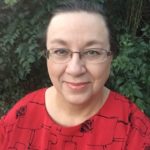 Jamie Graham is the owner of Healing Touch Acupuncture and is a licensed acupuncturist practicing in Waco. She has a Master of Science in Oriental Medicine from the Academy of Oriental Medicine at Austin. She and her husband, Bob, will be celebrating 43 years of marriage in March. She has one daughter and one grandson who are the joy of her life. She is owned by a Russian blue cat named Walter and a very spoiled shih tzu named Brandi. When she’s not using needles as an acupuncturist, she uses different kinds of needles in her textile art, quilting, knitting and embroidery work.
Jamie Graham is the owner of Healing Touch Acupuncture and is a licensed acupuncturist practicing in Waco. She has a Master of Science in Oriental Medicine from the Academy of Oriental Medicine at Austin. She and her husband, Bob, will be celebrating 43 years of marriage in March. She has one daughter and one grandson who are the joy of her life. She is owned by a Russian blue cat named Walter and a very spoiled shih tzu named Brandi. When she’s not using needles as an acupuncturist, she uses different kinds of needles in her textile art, quilting, knitting and embroidery work.
You may contact Jamie at Healing Touch Acupuncture: 254-759-8050 | [email protected] | www.healingtouchacupuncture.com | www.Facebook.com/HealingTouchAcupuncture
The Act Locally Waco blog publishes posts with a connection to these aspirations for Waco. If you are interested in writing for the Act Locally Waco Blog, please email [email protected] for more information.
(The Heart of Texas P-20 Council includes representatives from K-12 education, higher education and employers. They meet regularly to help coordinate efforts to launch our young people into productive lives as workers and citizens. This post is one in a monthly series of posts intended to share information about the work of this important group in our community. For more posts in this series, click here: P-20 education. – ABT)
By Christine Holecek
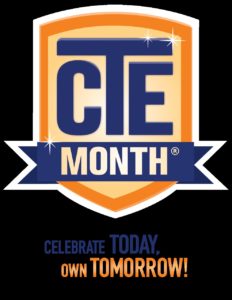 ESC Region 12 and the HOT P-20 Council celebrates February as Career and Technical Education Month (CTE), as well as, the kick -off of Groundhog Job Shadowing. Students and faculty in Region 12 will join others across the nation during the month of February to celebrate national CTE month. This year’s tagline is Celebrate Today, Own Tomorrow! CTE Month provides CTE programs across the country an opportunity to demonstrate how CTE makes students college and career ready and prepares them for high-wage, high-skill, and high-demand career fields. School districts are encouraged to promote CTE programs and give their students the opportunity to job shadow during the month of February. February 2nd is Groundhog Day and a perfect day to job shadow.
ESC Region 12 and the HOT P-20 Council celebrates February as Career and Technical Education Month (CTE), as well as, the kick -off of Groundhog Job Shadowing. Students and faculty in Region 12 will join others across the nation during the month of February to celebrate national CTE month. This year’s tagline is Celebrate Today, Own Tomorrow! CTE Month provides CTE programs across the country an opportunity to demonstrate how CTE makes students college and career ready and prepares them for high-wage, high-skill, and high-demand career fields. School districts are encouraged to promote CTE programs and give their students the opportunity to job shadow during the month of February. February 2nd is Groundhog Day and a perfect day to job shadow.
“The activities planned over the next month will illustrate the rigor and relevance CTE courses offer our students,” said Fred Hills, Chair of the HOT P-20 Council. “By partnering with the business community, CTE programs are investing in students and providing them with the latest technology and skills that will prepare them to become successful employees and future leaders”
CTE is a major part of the solution to a myriad of national economic and workforce problems, such as high school dropout rates, a weakened economy, global competitiveness and massive layoffs. At a time when the opportunity for employment is so critical, CTE programs in every community are ensuring students are equipped with the skills to successfully enter the workforce.
 Members of the Greater Waco Chamber of Commerce have expressed interest in hosting high school students in the workplace for shadowing experiences. (Click here for the list of members and contacts.) The HOT P-20 Council has provided materials for school districts and employers to utilize for Job Shadowing at http://www.hotp20.org/page2.
Members of the Greater Waco Chamber of Commerce have expressed interest in hosting high school students in the workplace for shadowing experiences. (Click here for the list of members and contacts.) The HOT P-20 Council has provided materials for school districts and employers to utilize for Job Shadowing at http://www.hotp20.org/page2.
Please share your CTE program initiatives and job shadowing successes to [email protected].
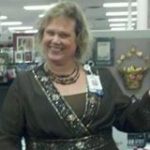 This Act Locally Waco blog post was written by Christine Holecek. Christine is an Education Specialist at Education Service Center Region 12 in Waco. She has worked in the area of Adult Education and Career & Technical Education for the past 25 years. She earned an AAS degree from MCC, a BAAS and Master’s Degree from the University of North Texas and is currently enrolled in the Doctoral Program in Educational Leadership and Policy Studies at Tarleton State University.
This Act Locally Waco blog post was written by Christine Holecek. Christine is an Education Specialist at Education Service Center Region 12 in Waco. She has worked in the area of Adult Education and Career & Technical Education for the past 25 years. She earned an AAS degree from MCC, a BAAS and Master’s Degree from the University of North Texas and is currently enrolled in the Doctoral Program in Educational Leadership and Policy Studies at Tarleton State University.
The Act Locally Waco blog publishes posts with a connection to these aspirations for Waco. If you are interested in writing for the Act Locally Waco Blog, please email [email protected] for more information.
